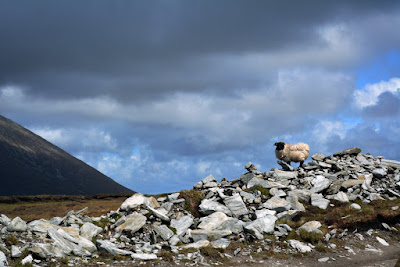Rihla (The Journey) – was the
short title of a 14th Century (1355 CE) book written in Fez by the Islamic
legal scholar Ibn Jazayy al-Kalbi of Granada who recorded and then transcribed
the dictated travelogue of the Tangerian, Ibn Battuta. The book’s full title
was A Gift to Those who Contemplate the
Wonders of Cities and the Marvels of Travelling and somehow the title of
Ibn Jazayy's book captures the ethos of many of the city and country journeys I
have been lucky to take in past years.
This Rihla is about modern reflections and pre-historic
sound in Achill Island.
You get to Achill
Henge by travelling through Keel village westwards and about 1km later taking a
road to the right, signposted the Hill, just beyond the church in Poolagh.
After 50m or so there is a small wooden sign, low to the ground, pointing to a
trackway to the right with Achill Henge written on it. From here the road
climbs upwards and swings first to the left and then to the right 50m beyond a
corrugated shed. The Henge appears as you mount a small rise and although
expected, from previously seen photographs, it really is a surprise.
Achill Island
Henge was built over a weekend in November 2011 by Irish banking-crisis and
serial monumental protestor Joe McNamara. It is built on commonage in which
McNamara had an interest. It consists of 30 concrete columns, 4 m high capped
by further ring of concrete lintel slabs and is 36 m in diameter and 100 m in
circumference. It is situated on a small hill 118m surrounded by upland blanket
bogland above the villages of Pollagh and Dooagh on Achill Island, Co. Mayo,
Ireland and along side an unpaved hill trackway that meanders northwards and
upwards to the deserted famine village on the southern slopes of Slíabh Mór.
Mayo County
Council took instant umbrage at the unscheduled development and ordered
McNamara to take it down. He appealed to An Bord Pleanála (the National
Planning Authority) on a number of grounds but primarily that the Henge
constituted an exempted development because he wanted to create an ornamental
garden on agricultural land. In July 2012 An Bord Pleanála declared the
existing Henge structure unauthorised, and that those works and future planned
completion works on the site were not “an exempted development”. McNamara had
submitted that in a second phase he planned to construct an inner circle of
columns of the same height and a central column 5m high. He also planned a 40m
high “lighthouse” and claimed exemption for this as it would be a navigational
aid.
It is well that
the full development did not get approval. As it stands the Henge is at its
simplest and I think most effective and should be retained. The presence of a
central column in particular would have taken away or negated what is now a
perfect acoustic point, where sound is amplified by its reflection from the
surrounding circumference of concrete columns. I always find this phenomenon
fascinating, whether it be under the central dome of the Masjed-e Imam (Shah)
Mosque in Isfahan, Iran or on the side of mountain in the West of Ireland. In
addition to this the acoustic properties and significance of large henge
structures such as Stonehenge are increasingly being investigated.
McNamara said
the Henge was a place of “reflection” and perhaps this is what he meant.
However he also applied for an exempted development status for the site on the
grounds that it was a ‘burial ground’ (Class 40 of Part 1 of Schedule 2 of
Planning and Development Regulations 2001): a burial ground for the Celtic
Tiger!
References:
Acoustic Henges:
http://www.salford.ac.uk/computing-science-engineering/research/acoustics/architectural-and-building-acoustics/acoustics-of-stonehenge
http://www.mayonews.ie/component/content/article?id=15914:british-researcher-pitches-for-achill-henge













No comments:
Post a Comment